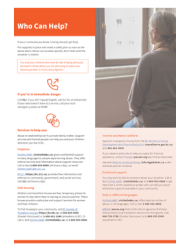Who Can Help?
If you or someone you know is being abused, get help.
Put supports in place and make a safety plan as soon as the abuse starts. Abuse can escalate quickly. Don’t wait until the situation is violent.
You and your children are most at risk of being seriously harmed or killed when you are planning to leave your abusive partner or if you are pregnant.
If you’re in immediate danger
Call 911. If you don’t speak English, ask 911 for an interpreter. If your area doesn’t have 911 service, call your local emergency police or RCMP.
Services to help you
Abuse in relationships isn’t a private family matter. Support services and trained people can help you and your children wherever you live in BC.
VictimLinkBC gives confidential support in many languages to people experiencing abuse. They offer referral services and information about support resources. Call or text 1-800-563-0808 (24 hours a day), or email VictimLinkBC@bc211.ca.
BC211 provides free information and referrals to community, government, and social services. Call 211 (24 hours a day).
Shelters and transition houses are free, temporary places for women to stay when they’re leaving an abusive partner. These houses provide a safe place and support services for women and their children.
To find housing in your community, call BC Society of Transition Houses at 604-669-6943 (Greater Vancouver) or 1-800-661-1040 (elsewhere in BC). Or call or text VictimLinkBC at 1-800-563-0808.
Apply for emergency money from the BC Ministry of Social Development and Poverty Reduction at 1-866-866-0800.
If you need an advocate to help you apply for financial assistance, contact PovNet (click “Find an Advocate”).
See also What to Do About Money.
You may want to talk to someone about your situation. Call or text VictimLinkBC at 1-800-563-0808 to get help from a victim assistance worker who can tell you about emotional supports available in your community.
VictimLinkBC offers help for victims of abuse in 150 languages. Call or text 1-800-563-0808.
AMSSA lists multicultural agencies that have interpretation and translation services for immigrants. Call 604-718-2780 (Greater Vancouver) or 1-888-355-5560 (elsewhere in BC).
Legal help
Contact Legal Aid BC to learn about free legal services. Tell them if you’ve been abused and need help to keep you and your children safe. You may qualify for a free lawyer. Our services are in many languages. Call 604-408-2172 (Greater Vancouver) or 1-866-577-2525 (elsewhere in BC).
If you don’t qualify for a lawyer to take your case, you can find out about other legal services, such as:
- Family LawLINE
- Family duty counsel (a lawyer at court)
Other Legal Aid BC resources:
The Lawyer Referral Service gives you the name of a lawyer you can talk to about your legal issue for free for 15 minutes. Call 604-687-3221 (Greater Vancouver).
Access Pro Bono offers free legal advice to people with low and modest incomes by phone or videoconference. Call 604-878-7400 (Greater Vancouver) or 1-877-762-6664 (elsewhere in BC).
Call or text VictimLinkBC at 1-800-563-0808 for the name of a Native courtworker near you who can help.
QMUNITY provides referrals to lawyers, shelters, and other resources. Call 604-684-5307 (ext. 100).
Legal Aid BC produces resources about the law. The following resources are about abuse:
- Clear Skies is a graphic novel that introduces you to your legal rights through storytelling and artwork.
- For Your Protection: Peace Bonds and Family Law Protection Orders explains how and when to apply for peace bonds and family law protection orders and the differences between them.
- Mothers Leaving Abusive Partners: Family Law Information describes how to protect yourself and your children, what the courts can do, deciding parenting arrangements, and where to get help and support.
To read these resources, see legalaid.bc.ca/read.
If you’re using a computer or mobile device that your partner has access to, erase your browsing history. For more information, see wikihow. You could also consider using a computer at a library.


